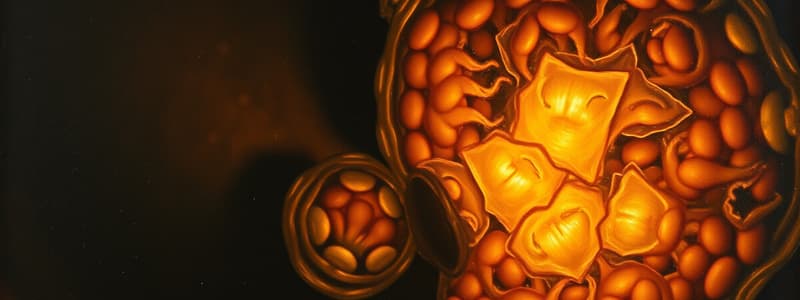Podcast
Questions and Answers
What is a primary function of the Golgi apparatus?
What is a primary function of the Golgi apparatus?
- Packaging of biochemicals into vesicles (correct)
- Formation of ribosomes
- Storage of genetic material
- Synthesis of ATP
Which of the following best describes the structure of mitochondria?
Which of the following best describes the structure of mitochondria?
- A stack of flattened membranous sacs
- A single membrane with cristae
- A simple spherical organelle
- A double membrane with an infolded inner membrane (correct)
In which cells is the Golgi apparatus especially prominent?
In which cells is the Golgi apparatus especially prominent?
- Support cells
- Storage cells
- Protective cells
- Metabolically active cells, such as secretory cells (correct)
What is the matrix of mitochondria known to contain?
What is the matrix of mitochondria known to contain?
Which statement about mitochondria is true?
Which statement about mitochondria is true?
Flashcards are hidden until you start studying
Study Notes
Golgi Apparatus
- Composed of a stack of flattened membranous sacs, known as cisternae.
- One side fuses with vesicles from the rough endoplasmic reticulum (RER) or smooth endoplasmic reticulum (SER).
- The opposite side forms vesicles which pinch off from the margins.
- Present in all cells, particularly abundant in secretory and metabolically active cells.
- Functions in synthesizing specific biochemicals, including hormones and enzymes.
- Proteins are modified through glycosylation (addition of sugars) or removal of methionine.
- Packaged into vesicles, which can form lysosomes in animal cells or contain polysaccharides in plant cells for cell wall formation.
Mitochondria
- Characterized by a rod-shaped or cylindrical structure, varying in shape and size.
- Typically range from 0.5 to 1.5 micrometers in width and 3.0 to 10.0 micrometers in length.
- Abundant in all cell types, with thousands present in metabolically active cells such as muscle fibers and hormone-secreting cells.
- Enclosed by a double membrane: the smooth outer membrane and the inner membrane, which is infolded to create cristae.
- Contains a matrix filled with enzymes, metabolites, and small circular DNA molecules.
- Primary site for aerobic respiration and ATP synthesis.
- Mitochondria and chloroplasts possess their own ribosomes, smaller than those found in the cytosol and attached to RER.
Studying That Suits You
Use AI to generate personalized quizzes and flashcards to suit your learning preferences.


